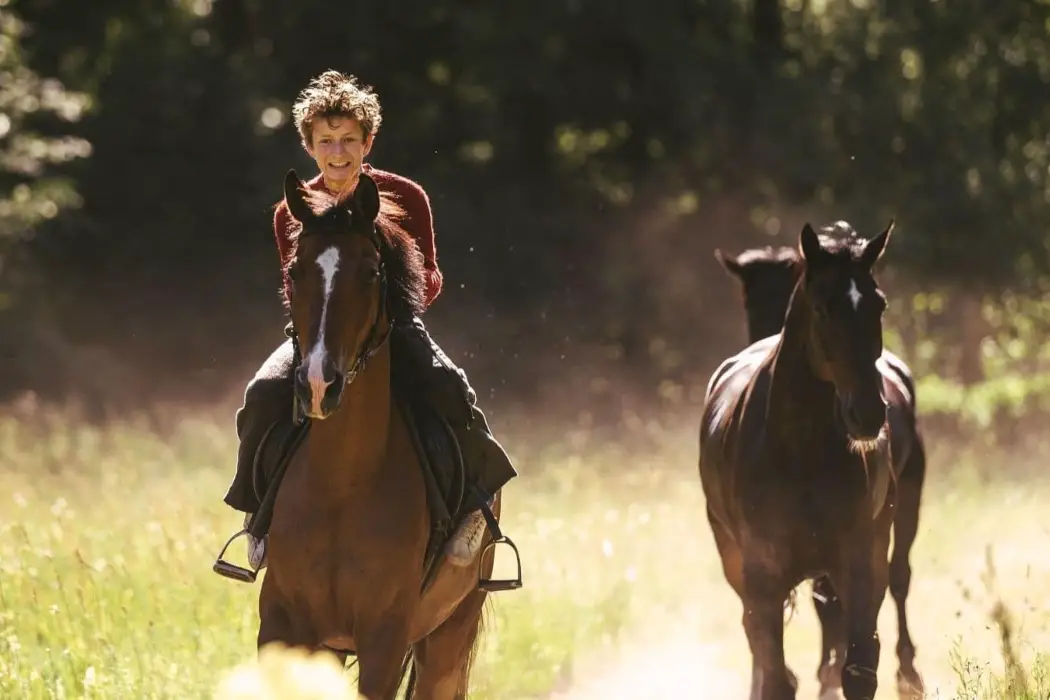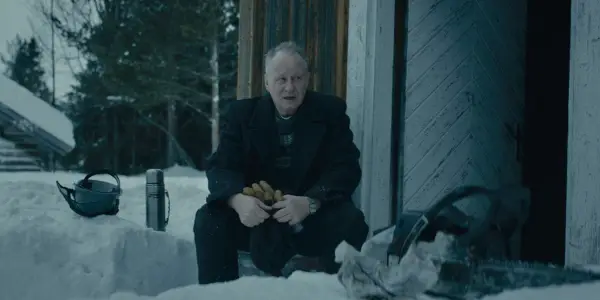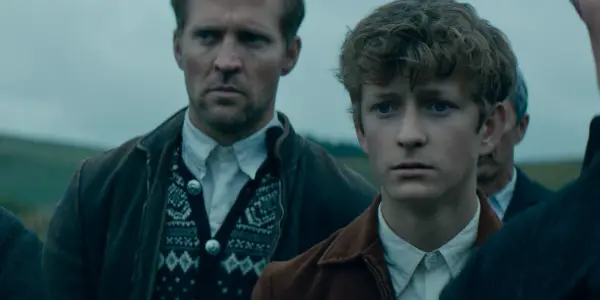OUT STEALING HORSES: A Poetic & Softly Distressing Exploration Of Memory

Andrew Stover is a film critic/writer from the Chicagoland. His…
As we all know, our existence comes with innate hurdles. Our memories fade due to age or repression. Our philosophies and beliefs are challenged by unexpected tragedies and occurrences. And our relationships with our parents, siblings, and friends are constantly adapting or corroding due to the cruel essence of time or proximity. And the frightful fact remains that it only takes one dire incident to alter the trajectory of our lives. Out Stealing Horses, a graceful drama of memory and loss, strives to underscore the aforementioned mental processes with visual splendor and quietly powerful performances.
It was only last year when director Hans Petter Moland remade his own Norwegian thriller In Order of Disappearance and rebranded it as Cold Pursuit. By replacing Stellan Skarsgard with Liam Neeson, universal appeal proliferated. Despite retaining creative control, the American remake was an unsurprisingly dull and stiff reinterpretation. At first glance, it would appear that Moland is deserting the artsy Norwegian roots behind for commercial success, but he proves artsy folk wrong with his latest cinematic offering, Out Stealing Horses.
Based on Per Petterson’s Norwegian bestseller Out Stealing Horses, Hans Petter Moland’s weaves together a visually rich adaptation of the renowned novel. Transitioning back and forth a timeline spanning decades, Out Stealing Horses is a vast story of trauma and memory seen through the eyes of Trond, both as a wide-eyed 15-year-old teenager (Jon Ranes), and a disheartened 67-year-old man (Stellan Skarsgard) living a quiet existence in the Norwegian countryside.
A Tragic Summer & A Sober Winter
In November 1999, Trond moved back to Norway after spending 42 years in Sweden. Trond, a dejected 67-year-old man, now lives in seclusion, geographically and emotionally. Trond now occupies a comfy, poky cottage in a serene Norwegian village. While distracted on the road, Trond almost drives into an oncoming truck and crashes into a snowbank. At this exact moment, a devastating flashback plagued Trond’s mind and affected his cognizance. The flashback reveals that Trond’s wife died from a car accident, and Trond was in the driver’s seat. But, under the guise of determinism, Trond makes a bold statement reassuring himself that he doesn’t submit to guilt: “I don’t feel guilt. Only loss.”
Trond’s state of isolation is infiltrated by a cryptic, elderly man named Lars (Bjørn Floberg), who ends up near Trond’s house when looking for his dog. The man tends to overshare, startling Trond with an excruciatingly protracted and doleful tale about shooting a German Shepherd as a child. After finding the dog and telling the somber anecdote in its entirety, the men retreat back to their homes. But, little does Trond know, he won’t be having a restful night, as the man’s strange story prompts Trond to take a trip back to the summer of 1948 he spent with his unyielding and well-formed father (Tobias Santelmann).

In the year 1948, Trond is a 15-year-old teenager and elated to be spending the summer with his father (Tobias Santelmann) cutting down trees and sending them up the river to Sweden to be sold. Looking back with unavoidable subjectivity, the far-reaching woodlands remain untouched by WWII. Stunning shots of glistening trees, gentle streams, hopping rabbits, idle owls, and majestic horses provide a vivid, sensorial, and naturalistic setting that exudes nothing but beauty and repose. Woefully, the surrounding nature is matched by familial tragedy.
One day, Trond is out “stealing” horses with his friend Jon (Sjur Vatne Brean), but something dark and unsettling is eating Jon up from the inside. What Trond learns from his father is that the day before, Jon was supposed to be supervising his young twin brothers, but he lost sight of them and thought they’ve wandered outside. A baneful accident involving Jon’s loaded hunting rifle and Jon’s little brother, Lars, leaves the other twin brother dead — and amongst the chaos and grief, Jon blames himself and wallows in guilt.
Trond and Lars are compelled to face a new and murkier reality. Lars must live with the fact that he unintentionally shot his brother, while Jon naturally feels responsible. Even though Trond didn’t lose a sibling to such a barbaric accident, the young child’s death pushes him to contemplate life, and how fugacious and heartless life can be to the purest of souls. Sooner rather than later, Trond abandons his bubble of childhood innocence, and ventures forward into a seemingly comfortless world of aimless tragedy and agony quicker than usual.
Back in 1999, Trond has his suspicions about Lars, the neighbor who told him a sickly tale about shooting a dog as a child. Could this be the same Lars who accidentally shot and killed his twin brother? There’s clearly a seed of mystery planted here, but Moland isn’t trying to enhance the mystery with pseudo-inklings of peril. The mystery modestly boils over, leaving few surprises to chew on but more to consider when it comes to Trond and Lars’ shared distress.
Spanning Decades, Out Stealing Horses Maintains A Smooth Trajectory
The film adheres to a flashback narrative structure. At the risk of being scattered, Out Stealing Horses collates the past and present together with fluidity. The younger versions of Trond and Lars, who are captured in bright and creamy flashbacks that are deftly edited by Jens Christian Fodstad and Nicolaj Monberg, are clearly more innocent and reactive, whereas present-day Trond and Lars are emotionally hardened, thus making it difficult to remain invested in them. Even so, Trond and Lars’ character development is splendidly raw, if somewhat partial given the plot is made up of a lot of Trond’s and Lars’ memories.

Whilst Trond’s memory can likely be construed as untrustworthy and embroidered, the relationship between young Trond and his father is lyrically expressed. Tobias Santelmann is a subtly brooding presence with a heavy heart. Despite being frequently hard on Trond, there are moments in which they both react in joy as rain pours down from the sky, and at another point, they set out on a horse-riding excursion to Sweden to watch as their logs of woods are mildly going downstream.
Jon Ranes is equally as impressive as Santelmann, conveying Trond’s clashing feelings of glee, confusion, and rancor through taut body language. Stellan Skarsgard, once again helming a Hans Petter Moland picture, delivers another pleasantly withdrawn performance as 67-year-old Trond, taking on a role that entails demanding rigor and inscrutability, with only micro-expressions alluding to Trond’s internal feelings of regret and yearning. Trond’s not the most inherently intriguing narrator, as he assumes a sluggish monotone and demeanor, but you can’t help but wonder why Trond chooses to live in an isolated state. What is Trond holding onto? What, or who can’t he let go of? The summer of 1948 was the summer when Trond bought into adulthood, but at what cost?

There are a lot of moving parts in Hans Petter Moland’s Out Stealing Horses. The brimful, decade-spanning story, which is visibly bound together by its source material, is infused with poetic imagery at every turn. But, veering away from style over substance, the nuanced performances vitalize the subtle bursts of emotion that go unsaid.
Out Stealing Horses Is A Lyrical, Earnest, And Heartbreaking Trek Down Memory Lane
Overflowing with internal and external conflict (a family tragedy, a wobbly father-son relationship, an illicit sensual desire, grief, and loss), Hans Petter Moland’s Out Stealing Horses is a gently-paced, exceptionally-written, sensory experience. Coupled with Kaspar Kaae’s softly moving score and Rasmus Videbæk’s gorgeous cinematography (which combines attentive close-ups and versatile wide shots), Out Stealing Horses is an arresting expedition.
It is true that Out Stealing Horses doesn’t spend enough time in the present-day to render a stirring portrait of Trond’s modern (and forlorn) existence. That being said, the summer of 1948 proves to be a summer Trond, Lars, and I myself won’t soon forget.
Have you seen Out Stealing Horses? If not, are you interested in seeing it now? Let us know in the comments!
Out Stealing Horses is available to watch in select theaters and video on demand on August 7, 2020.
Watch Out Stealing Horses
Does content like this matter to you?
Become a Member and support film journalism. Unlock access to all of Film Inquiry`s great articles. Join a community of like-minded readers who are passionate about cinema - get access to our private members Network, give back to independent filmmakers, and more.
Andrew Stover is a film critic/writer from the Chicagoland. His film & TV reviews can be found on Film Inquiry & Film Threat.













